Prosecutors say Anthony man murdered his girlfriend. Defense says she committed suicide
Opening statements in the murder trial of Deangelo Leandrew Shelton Clark were delivered Wednesday in Circuit Judge Robert Hodges' courtroom, and lawyers from both sides presented vastly different theories on how a young mother died nearly four years ago.
Prosecutors said Clark brutally killed the woman when he found out she was seeing someone else. The defense countered that the woman was depressed and took her own life.
Clark is charged with second-degree murder in the death of his girlfriend, Kiara Alleyne. Marion County Sheriff's detectives said the 20-year-old woman was stabbed multiple times inside the couple's duplex apartment at 2241 NE 78th Lane in Anthony, on Sept. 11, 2019.
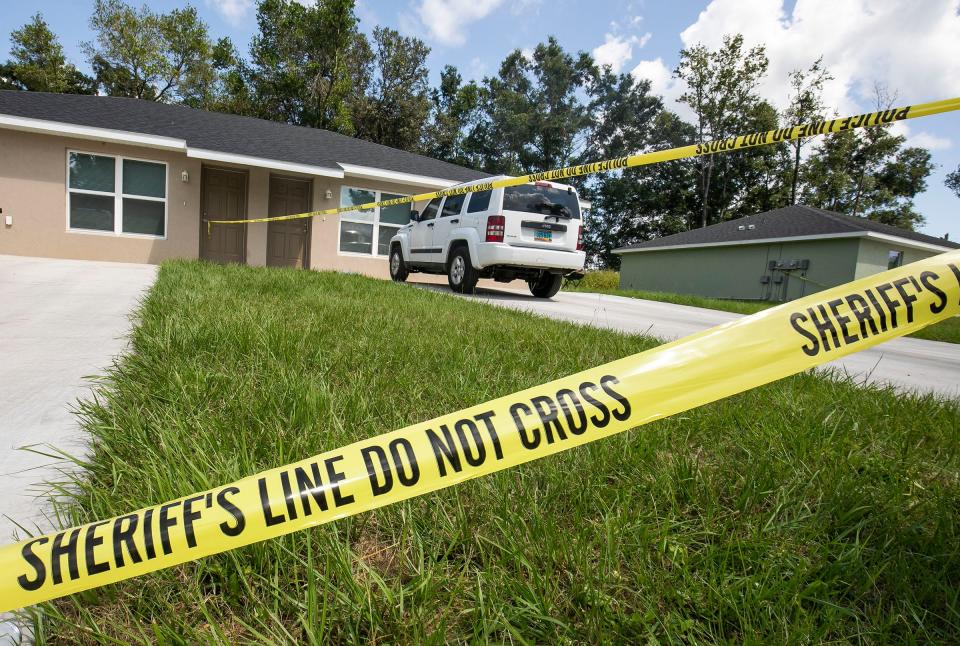
Sheriff's detectives said Clark, 34, took Jhene, the daughter he had with Alleyne, and drove to a location off Pine Avenue in Ocala. There, he met a relative and handed over the child.
Authorities said Clark then drove to the Florida Keys, where he set his car on fire, was burned, and had to be hospitalized.
Clark eventually was transported back to Marion County to face charges of murder and attempted arson of a dwelling and structure. The attempted arson charge stemmed from Clark allegedly trying to torch the apartment. When deputies entered the residence, they found a blanket inside an open oven that had been left on.
Assistant Public Defenders Amanda Sizemore, Jessica Roberts and Sara Altes are defending Clark. Assistant State Attorneys Amy Berndt and Katrina Self are prosecuting the case.
Prosecutor's statement
Berndt told jurors that sheriff's deputies found the victim in a pool of blood. She said Clark decided if he could not have her, then no one else would. Berndt said Alleyne, a beautiful young woman who wanted to be model, was stabbed repeatedly with a knife.
"The defendant went on a bloody rampage," the prosecutor said.
It was explained that although the couple had a child together, Alleyne wasn't happy and had met someone else. Clark found out and wasn't pleased.
The prosecutor said Alleyne, born and raised in Trinidad, met Clark when she was living in North Dakota. The two dated, had a child together and later moved to Marion County. Before coming to Marion, the couple was having problems, Berndt said.
Hours before her death, Clark had planned to celebrate their two-year anniversary with a special treat. Instead, they argued.
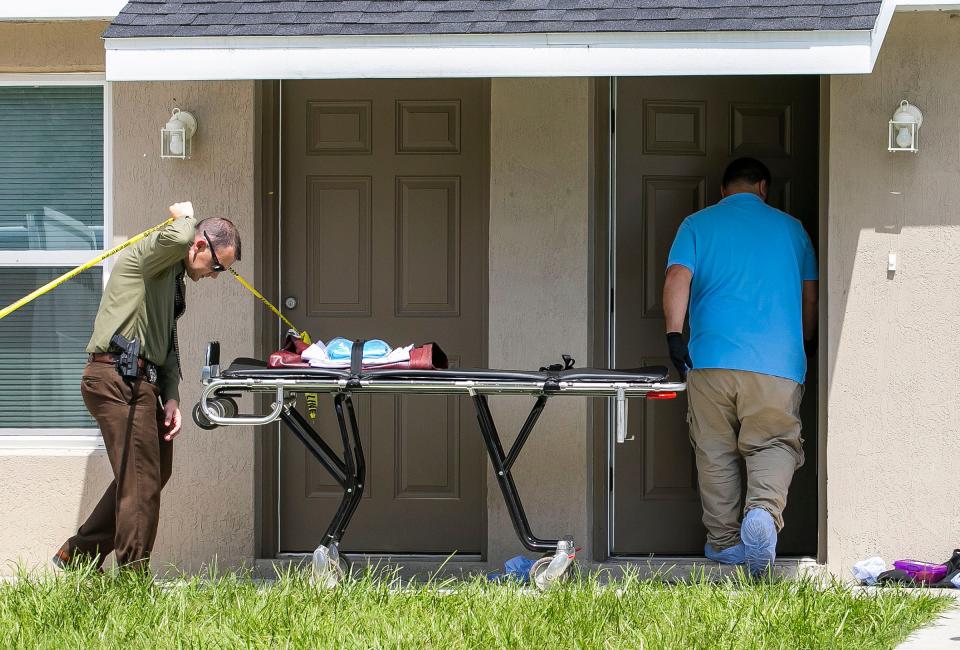
On the night of the death, Clark FaceTimed Alleyne's father, and he saw blood on Clark's face, Berndt said. The man heard his daughter screaming that Clark had a knife.
The phone was turned away and the next image seen by Alleyne's father was his daughter gasping and blood gushing from her neck. He asked Clark to help her, but Clark told him no, they'll take the baby away. Then Clark hung up, Berndt said.
Berndt said the victim's father and a friend called authorities. The prosecutor said when deputies and fire officials entered the residence, Alleyne already was dead.
After that, there was a "a very fast moving investigation," Berndt said. Clark eventually was found in the Keys. Clark set his vehicle on fire and burned himself. She asked the jury to find Clark guilty as charged.
The defense
In her opening statement, Sizemore told jurors that Clark did not kill Alleyne. Sizemore said Alleyne had a history of depression. Feeling pressured because of her romantic relationships and her desire to return to Trinidad, Alleyne reached a breaking point and committed suicide.
Sizemore urged jurors to pay close attention to the evidence. She said medical officials made their decision that Alleyne's death was a homicide because of information provided to them by law enforcement. The defense also noted said Alleyne had a previous suicide attempt.
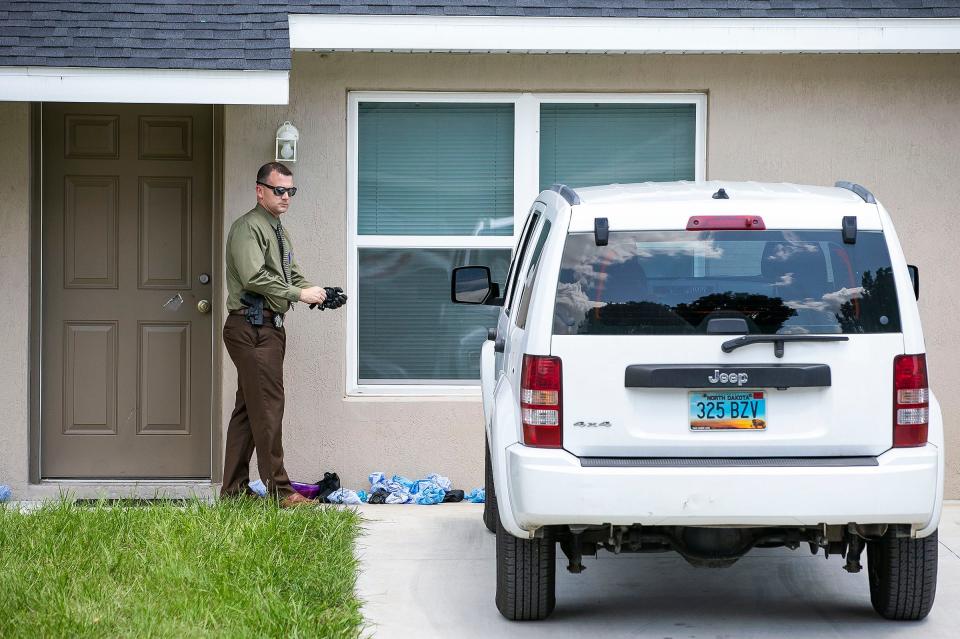
She said there were many problems with the investigation, including evidence collection and processing of the crime scene. Sizemore pointed out that 97 percent of the DNA recovered from the knife's handle traced back to Alleyne. She also said that Clark's DNA was not found under Alleyne's fingernails. She said Alleyne's death was a suicide.
Witness testimony
Berndt and Self took turns questioning state witnesses throughout the day Wednesday.
Alleyne's father, Sheldon Alleyne, was the first called to the stand. He was overcome with emotion and openly cried before testifying. In his testimony, Alleyne's father said he works on oil rigs and left Trinidad to make a better life for his family.
He said he regularly gave his daughter money, supported her desires, and paid for her vehicle. He said Clark told him about his daughter seeing another man. The man said he told his daughter if she didn't want to be with Clark, then she should leave him and move on.
During the FaceTime call, Alleyne's father said, he was in New Mexico. He said he asked Clark more than once to help his daughter; however, Clark refused and hung up.
"I was just trying to get help for her," the father said.
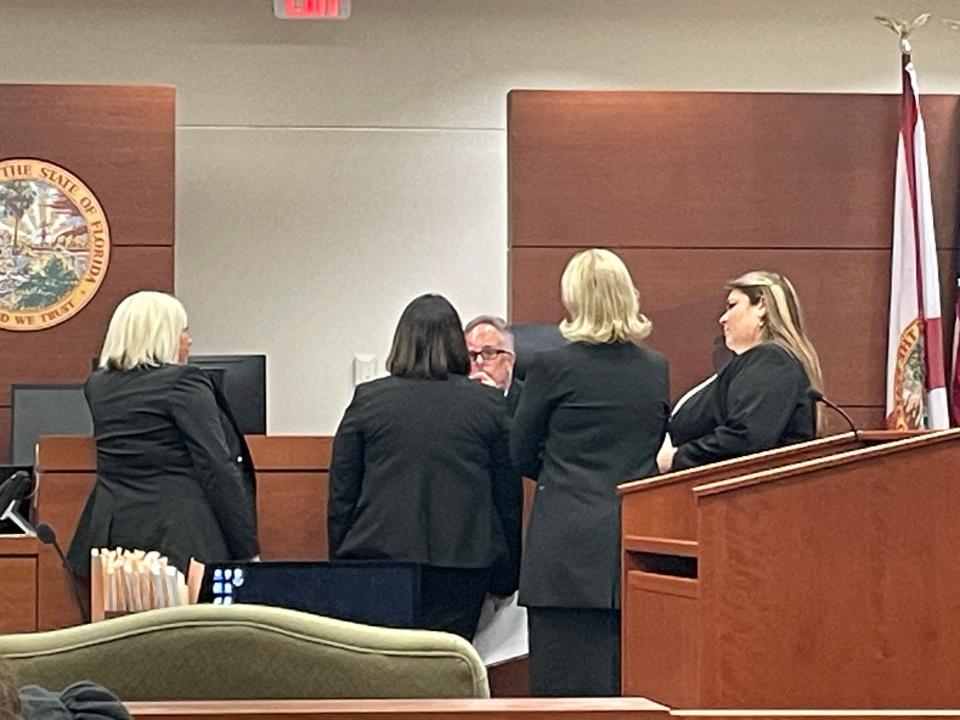
During the phone call, Alleyne said, Clark told him his daughter was crazy. He said his daughter sounded scared and was crying. He said he didn't know her address and frantically called people in Trinidad and the United States trying to get help for his daughter.
Cross-examined by the defense, Alleyne's father said his daughter once attempted suicide. He said he didn't remember seeing a knife. He said no one ever asked about his daughter's prior suicide attempt.
Other witnesses
Two of the victim's friends, a man and woman, each testified for the prosecution. They told the court they were friendly with the victim and knew about the couple's problems. They said they kept in contact with the couple when they left North Dakota.
Altes, in her questioning of the man and woman, focused on Alleyne's behavior. For instance, with the woman, Altes asked about Alleyne's mood before moving to Marion County. The woman said her friend's personality and attitude changed after awhile. There was a time when the friend was visiting Orlando and Alleyne was supposed to come see her. She never did.
The male friend told Altes that law enforcement never talked to him about the conversations, such as Snapchat messages, he had with Clark not long before the death.
Afternoon session
Law enforcement officials and evidence technicians from the sheriff's office testified for the prosecution following the lunch break.
Those witnesses told jurors about their roles in the investigation. Deputies testified about what they saw when they arrived at the incident location, which people they interviewed, and how and why they made entry into the residence.
One deputy said a Facebook message was sent from someone who wanted a well-being check conducted at the residence. That message, reportedly made by Clark, alluded to him ending his life.
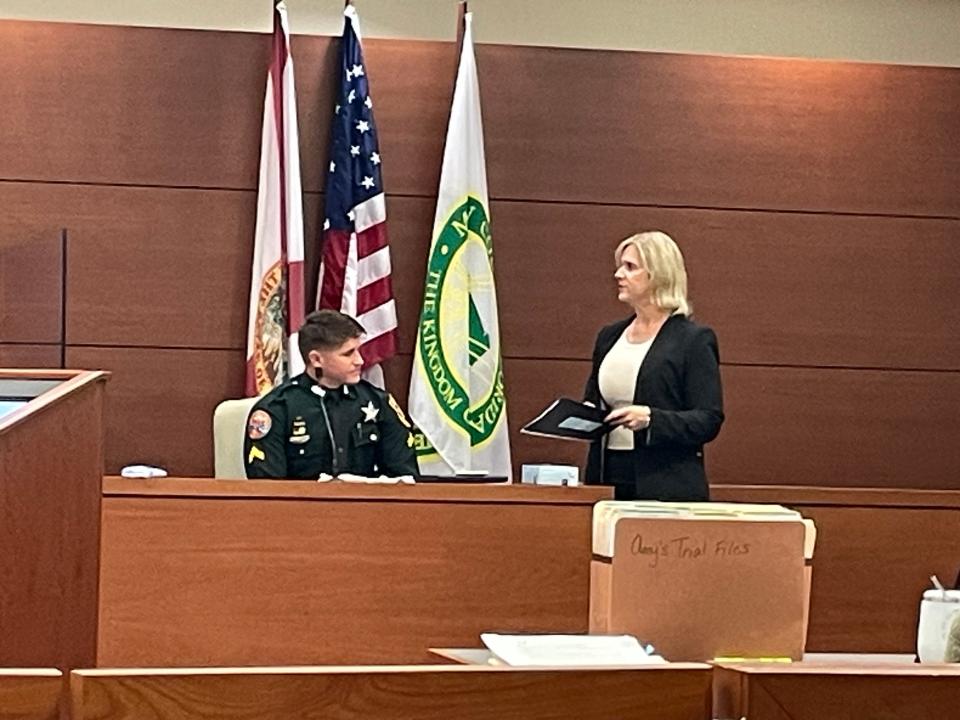
In court, the prosecution played body camera video showing deputies inside the apartment checking each room and eventually locating Alleyne. Berndt and Self showed the court pictures, some of them graphic, from the crime scene.
Sizemore and Roberts questioned how the evidence was gathered, preserved and stored. For example, Roberts asked an evidence technician if it was possible that shoeprints seen inside the home could have come from deputies. Yes, he was told. Also, did detectives handle the same evidence technicians did? Again, the answer was yes.
Others who took the stand for the prosecution were a woman whose home Clark went to after his vehicle caught fire, two deputies from the Keys, a detective, and a retired crime analysis.
The woman told the court she heard a loud bomb-like sound. When she went outside to investigate, she saw a man approaching her residence. The man's skin was peeling from his body. She called 911.
Years behind bars: 35 years in prison for man who killed his mom and dog, then set the house on fire.
One deputy identified Clark as the person who was badly burned. Multiple pictures of Clark's charred car taken by the detective were shown in court. He said evidence removed from the vehicle was sent to a laboratory for testing.
Roberts asked about that evidence collection. She asked the detective if he saw Clark in the vehicle, whether he was present when the fire started, and whether he had talked to any witnesses. The answer to all those questions was no.
The trial resumed Thursday, with the prosecution expected to wrap up its case. The defense will follow, and then both sides will deliver closing arguments. The trial should conclude on Friday.
Contact Austin L. Miller at austin.miller@starbanner.com or @almillerosb
This article originally appeared on Ocala Star-Banner: Prosecutors, defense differ on how young mom was killed

